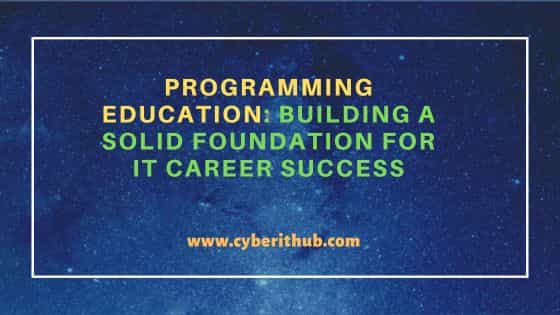Table of Contents

A career in IT can be a rewarding and diverse experience with a wide range of opportunities. The field of information technology consists of various roles and specializations, allowing you to pick a path that aligns with your specific interests and skills. Education in programming is a crucial step for anyone who is looking to pursue a career in software development or related areas.
Programming education gives individuals the necessary skills and knowledge to design, build, and continue making software applications and systems. Creating a solid foundation for IT career achievements requires a combination of technical skills, constant learning, professional development, and a strategic plan for your career. Here are some key steps you can take to build a strong foundation for IT career success.
Identify your interests and goals
Start by figuring out your interests within the IT field. IT is a vast and multifaceted field, so it's important to identify the areas that genuinely thrill you. When you’re in college pursuing a degree in IT, you may want to pay for research papers to get them written by professionals. Some great online platforms are used by college students globally who want to focus on their academics while identifying their goals for the future. Set clear short-term and long-term professional goals to give yourself guidance and motivation.
Gain practical experience
Theory alone is not sufficient in IT. Practical experience is highly respected in this field. Look for internships, part-time jobs, and volunteer opportunities to gain hands-on knowledge. Additionally, consider creating your own projects or contributing to open-source projects to communicate your skills and build a portfolio.
Acquire relevant technical skills
IT is a rapidly evolving field, and staying up to date with the newest trends and tech is crucial. Identify the specialized skills that align with your goals and concentrate on gaining them. This includes programming languages, database management, network administration, cybersecurity, data analysis, cloud computing, or any other specialized areas. Take courses, get certifications, and participate in hands-on projects to build your expertise.
Develop problem-solving and critical-thinking skills
IT professionals often face complex problems that need analytical thinking and creative resolutions. Sharpen your problem-solving and critical thinking skills by practicing logical reasoning, coding challenges, and puzzles. This will help you stand out and be compelling in your work.
Cultivate a continuous learning mindset
The world of IT is ever-dynamic, so embracing lifelong education is crucial. Stay updated on industry information, follow influential blogs, join suitable online communities, and attend gatherings or conferences. As a student who may occasionally need help with school papers or essay writing, you can also take the help of essay writing services to keep learning consistently. Invest time in constant learning to keep pace with new technologies, processes, and best industry practices.
Network and build professional relationships
Networking is an integral aspect of any career, including IT. Attend events in the industry, join professional associations, and connect with people in your field. Networking can open doors to job opportunities, mentorship, and team-ups. Also, consider creating an online presence through platforms like LinkedIn to show your skills and connect with experts in your industry.
Develop soft skills
Technical expertise alone is not sufficient for a successful IT career. Soft skills such as communication, collaboration, problem-solving, adaptability, and leadership are equally necessary. Improve your interpersonal and communication skills to effectively collaborate with coworkers, manage tasks, and interact with clients or end-users.
Seek mentorship and guidance
Find experienced professionals in your domain who can provide guidance, advice, and mentorship. A mentor can help you traverse your career path, provide practical insights, and help you avoid typical pitfalls. Their experience and viewpoint can be priceless in shaping your career.
Stay adaptable and embrace change
The IT industry is dynamic, and new technologies often disrupt the status quo. Welcome change and be ready to adjust to new tools, methods, and industry shifts. Demonstrating adaptability and agility will make you an invaluable asset to employers and set you up for long-term success.
Set clear goals and track your progress
Regularly assess your goals, set milestones, and follow your progress. Monitor your accomplishments, identify areas for progress, and make adjustments to your career plan accordingly. Having a clear roadmap and regularly examining your progress will help you stay attentive and motivated.
Conclusion
Regardless of the chosen career path, programming education is a lengthy process. As technology develops, programmers must continuously revamp their skills and stay current with the latest programming languages, frameworks, and best practices. Continuously invest in your skills, keep discovering, and adapt to industry changes. By doing so, you'll position yourself for a rewarding and thriving IT career.
Author’s Bio - Ruby Butz
Ruby Butz is a dynamic and dedicated IT educator with a strong commitment to promoting technology literacy and empowering students to become critical thinkers. With years of experience in the field, she has played a key role in shaping the minds of countless students, providing them with the necessary skills to thrive in the digital age. In her free time, Ruby enjoys exploring new technologies, reading books on education, and volunteering at local tech events.

